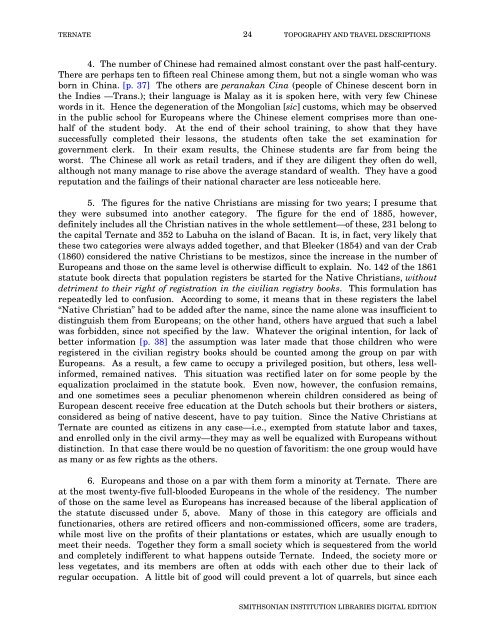Ternate - Smithsonian Institution Libraries
Ternate - Smithsonian Institution Libraries
Ternate - Smithsonian Institution Libraries
Create successful ePaper yourself
Turn your PDF publications into a flip-book with our unique Google optimized e-Paper software.
TERNATE 24 TOPOGRAPHY AND TRAVEL DESCRIPTIONS<br />
4. The number of Chinese had remained almost constant over the past half-century.<br />
There are perhaps ten to fifteen real Chinese among them, but not a single woman who was<br />
born in China. [p. 37] The others are peranakan Cina (people of Chinese descent born in<br />
the Indies —Trans.); their language is Malay as it is spoken here, with very few Chinese<br />
words in it. Hence the degeneration of the Mongolian [sic] customs, which may be observed<br />
in the public school for Europeans where the Chinese element comprises more than onehalf<br />
of the student body. At the end of their school training, to show that they have<br />
successfully completed their lessons, the students often take the set examination for<br />
government clerk. In their exam results, the Chinese students are far from being the<br />
worst. The Chinese all work as retail traders, and if they are diligent they often do well,<br />
although not many manage to rise above the average standard of wealth. They have a good<br />
reputation and the failings of their national character are less noticeable here.<br />
5. The figures for the native Christians are missing for two years; I presume that<br />
they were subsumed into another category. The figure for the end of 1885, however,<br />
definitely includes all the Christian natives in the whole settlement—of these, 231 belong to<br />
the capital <strong>Ternate</strong> and 352 to Labuha on the island of Bacan. It is, in fact, very likely that<br />
these two categories were always added together, and that Bleeker (1854) and van der Crab<br />
(1860) considered the native Christians to be mestizos, since the increase in the number of<br />
Europeans and those on the same level is otherwise difficult to explain. No. 142 of the 1861<br />
statute book directs that population registers be started for the Native Christians, without<br />
detriment to their right of registration in the civilian registry books. This formulation has<br />
repeatedly led to confusion. According to some, it means that in these registers the label<br />
“Native Christian” had to be added after the name, since the name alone was insufficient to<br />
distinguish them from Europeans; on the other hand, others have argued that such a label<br />
was forbidden, since not specified by the law. Whatever the original intention, for lack of<br />
better information [p. 38] the assumption was later made that those children who were<br />
registered in the civilian registry books should be counted among the group on par with<br />
Europeans. As a result, a few came to occupy a privileged position, but others, less wellinformed,<br />
remained natives. This situation was rectified later on for some people by the<br />
equalization proclaimed in the statute book. Even now, however, the confusion remains,<br />
and one sometimes sees a peculiar phenomenon wherein children considered as being of<br />
European descent receive free education at the Dutch schools but their brothers or sisters,<br />
considered as being of native descent, have to pay tuition. Since the Native Christians at<br />
<strong>Ternate</strong> are counted as citizens in any case—i.e., exempted from statute labor and taxes,<br />
and enrolled only in the civil army—they may as well be equalized with Europeans without<br />
distinction. In that case there would be no question of favoritism: the one group would have<br />
as many or as few rights as the others.<br />
6. Europeans and those on a par with them form a minority at <strong>Ternate</strong>. There are<br />
at the most twenty-five full-blooded Europeans in the whole of the residency. The number<br />
of those on the same level as Europeans has increased because of the liberal application of<br />
the statute discussed under 5, above. Many of those in this category are officials and<br />
functionaries, others are retired officers and non-commissioned officers, some are traders,<br />
while most live on the profits of their plantations or estates, which are usually enough to<br />
meet their needs. Together they form a small society which is sequestered from the world<br />
and completely indifferent to what happens outside <strong>Ternate</strong>. Indeed, the society more or<br />
less vegetates, and its members are often at odds with each other due to their lack of<br />
regular occupation. A little bit of good will could prevent a lot of quarrels, but since each<br />
SMITHSONIAN INSTITUTION LIBRARIES DIGITAL EDITION

















